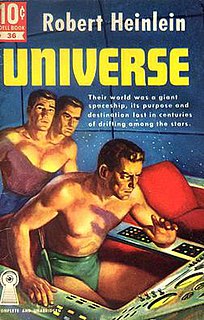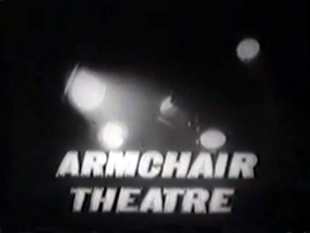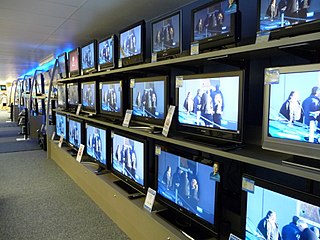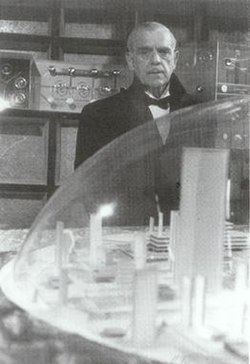
The Caves of Steel is a science fiction novel by American writer Isaac Asimov. It is a detective story and illustrates an idea Asimov advocated, that science fiction can be applied to any literary genre, rather than just being a limited genre in itself.

The Robot series is a series of 38 science fiction short stories and five novels by American writer Isaac Asimov, featuring positronic robots.

Out of the Unknown is a British television science fiction anthology drama series, produced by the BBC and broadcast on BBC2 in four series between 1965 and 1971. Each episode was a dramatisation of a science fiction short story. Some were written directly for the series, but most were adaptations of already-published stories.

X Minus One was an American half-hour science fiction radio drama series broadcast from April 24, 1955 to January 9, 1958 in various timeslots on NBC. Known for high production values in adapting stories from the leading American authors of the era, X Minus One has been described as one of the finest offerings of American radio drama and one of the best science fiction series in any medium.

Thomas Nigel Kneale was a British screenwriter. He wrote professionally for more than 50 years, was a winner of the Somerset Maugham Award, and was twice nominated for the BAFTA Award for Best British Screenplay. In 2000, he received the Lifetime Achievement Award from the Horror Writers Association.

Play for Today is a British television anthology drama series, produced by the BBC and transmitted on BBC1 from 1970 to 1984. During the run, more than three hundred programmes, featuring original television plays, and adaptations of stage plays and novels, were transmitted. The individual episodes were between fifty and a hundred minutes in duration. A handful of these plays, including Rumpole of the Bailey and The Blackstuff, subsequently became television series in their own right.

The Wednesday Play is an anthology series of British television plays which ran on BBC1 from October 1964 to May 1970. The plays were usually written for television, although adaptations from other sources also featured. The series gained a reputation for presenting contemporary social dramas, and for bringing issues to the attention of a mass audience that would not otherwise have been discussed on screen.

Armchair Theatre is a British television drama anthology series of single plays that ran on the ITV network from 1956 to 1974. It was originally produced by Associated British Corporation. Its franchise successor Thames Television took over from mid-1968.
Theatre 625 is a British television drama anthology series, produced by the BBC and transmitted on BBC2 from 1964 to 1968. It was one of the first regular programmes in the line-up of the channel, and the title referred to its production and transmission being in the higher-definition 625-line format, which only BBC2 used at the time.

BBC television dramas have been produced and broadcast since even before the public service company had an officially established television broadcasting network in the United Kingdom. As with any major broadcast network, drama forms an important part of its schedule, with many of the BBC's top-rated programmes being from this genre.

The Year of the Sex Olympics is a 1968 television play made by the BBC and first broadcast on BBC2 as part of Theatre 625. It stars Leonard Rossiter, Tony Vogel, Suzanne Neve and Brian Cox. It was directed by Michael Elliott. The writer was Nigel Kneale, best known as the creator of Quatermass.
No Trams to Lime Street is a 1959 British television play, written by the Welsh playwright Alun Owen for the Armchair Theatre anthology series. Produced by the Associated British Corporation (ABC) for transmission on the ITV network, the play was broadcast on 18 October 1959. The original version no longer exists.
British television science fiction refers to popular programmes in the genre that have been produced by both the BBC and Britain's largest commercial channel, ITV. The BBC's Doctor Who is listed in the Guinness World Records as the longest-running science fiction television show in the world and as the "most successful" science fiction series of all time.

Armchair Thriller is a British television programme, broadcast on ITV in two series in 1978 and 1980. Owing something to some of the offshoots of the earlier Armchair Theatre, the new series used scripts adapted from published novels and stories. Although not properly a horror series, it included several supernatural elements. Armchair Thriller was produced by Thames Television, but it included serials made by Southern Television. The format was of 25-minute episodes broadcast twice-weekly, usually screened on a Tuesday or Thursday between 8 pm and 9 pm.

Tales of Tomorrow is an American anthology science fiction series that was performed and broadcast live on ABC from 1951 to 1953. The series covered such stories as Frankenstein, starring Lon Chaney, Jr., 20,000 Leagues Under the Sea starring Thomas Mitchell as Captain Nemo, and many others featuring such performers as Boris Karloff, Brian Keith, Lee J. Cobb, Veronica Lake, Rod Steiger, Bruce Cabot, Franchot Tone, Gene Lockhart, Walter Abel, Cloris Leachman, Leslie Nielsen, and Paul Newman. The series had many similarities to the later Twilight Zone which also covered one of the same stories, "What You Need". In total it ran for eighty-five 30-minute episodes. It was called “the best science-fiction fare on TV today” by Paul Fairman, editor of If.
A television play is a television programming genre which is a live drama performance broadcast from the television studio or, later, put on the tape.
Afternoon of a Nymph is an episode of the British Armchair Theatre series made by the ITV franchise holder ABC Television and first broadcast by the ITV network on 30 September 1962. It was written by Robert Muller and features Janet Munro and Ian Hendry in the lead roles. It was directed by Philip Saville and produced by Sydney Newman.





















